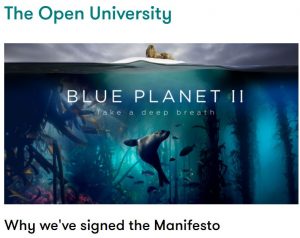
Professor Richard Holliman, The Open University.
‘Navigating change as we face the future’ was the core theme of the UK’s NCCPE-organised conference in Edinburgh, Scotland last week. For those reading this post from without or without the UK, it’s an appropriate theme. (To that end, we were joined at the conference by colleagues from Thailand, Korea, Canada, South Africa and India.)
Politically as a nation (and nations), the UK is obviously facing unprecedented change at the moment. That, thankfully, is for another day. Rather, the discussions at the Engage Conference focused on the challenges of navigating change to further improve mutually beneficial relations between universities and wider society.
Why focus on change? One of the key reasons is that it is 10 years since the introduction of the NCCPE. If you organise the conference, it seems reasonable that you have a primary role in deciding the theme. After eight national conferences exploring the theme of engagement, this was an opportunity to take stock, set priorities and plan the next steps.
Over the 10-year period that we’ve had the NCCPE, the UK university sector has changed dramatically, not least with the introduction of:
- a student fee regime (currently under review);
- a new system for planning for, assessing, monitoring and reporting the social and economic impacts from research (for a review, see Holliman et al. 2018); and
- a revised version of the periodic sector-wide research audit (Research Excellence Framework).
These are still relatively new conditions for university systems, staff, publics and stakeholders to navigate. One of the NCCPE’s core functions is support universities as they adapt to these new requirements and what they mean for engaging with (prospective) students, stakeholders, end-users, community organisations, NGOs and members of the public.
Many of the challenges we face in the UK will be familiar to PCST members working in other countries to promote best practice in communication and engagement, including questions about: how to build and sustain fair and equitable partnerships; how to recognise the effort and secure funding on a sustainable basis to deliver high-quality engagement; and how to lead change to ensure the conditions are in place to deliver excellence.
The discussions at the Engage Conference were, as always, stimulating, respectful and provocative, a mixture of practical, evidence-based and theoretical interventions.
Two contributions really stood out for me. First, Dr Ruth Gill, Director of Public Programmes from the National Museum of Scotland, spoke about the need to provoke rather than instruct, and the importance of emotional intelligence in communication and engagement.

Co-creating evidence vs. co-creating change. Source: Carnegie Trust UK.
Second, Jennifer Wallace, Head of Policy at the Carnegie Trust UK, discussed the challenges of connecting evidence with policy and practice. In the image of the conference she illustrated how power-relations are influenced by the ways we practice engagement. Put simply, are university staff willing to practice as small fishes in bigger ponds?
I was particularly delighted to see four UK universities recognised for their ongoing work in creating cultures of excellence in engagement through the NCCPE’s Engage Watermark. To boot, the conference was an opportunity to catch up with old friends and colleagues (several of whom were in receipt of Engage Watermark Awards), and meet new people; such an important aspect of any conference.

The OU’s entry on the NCCPE’s Manifesto for Public Engagement.
Overall, the conference in Edinburgh was an opportunity to address some of the (new and old) challenges we face in engagement, and to map out aims, objectives and pathways to addressing them.
It was, of course, also an opportunity to promote some of the work conducted at the Open University. To that end, I was delighted to share learning from OU engagement, not least through our updated commitment to the NCCPE’s Manifesto for Public Engagement.
The PCST2020 Conference in Aberdeen, scheduled for 26 – 28 May 2020 will be a chance to extend this conversation beyond the context of the UK, and to share learning with PCST members.

The International Public Communication of Science and Technology Conference (PCST 2020); Aberdeen, Scotland, UK from 26 – 28 May 2020.
We’ve come a long way in the UK and beyond over the past 10 years; we have further challenges to address. More than ever, given the political uncertainties we face, I’m certain that we need to address these challenges as an international community.

